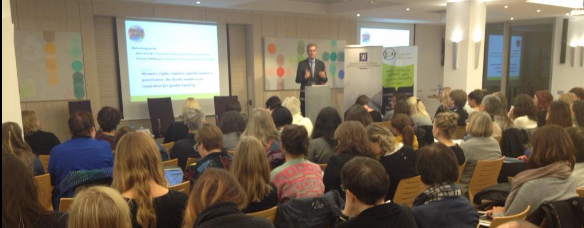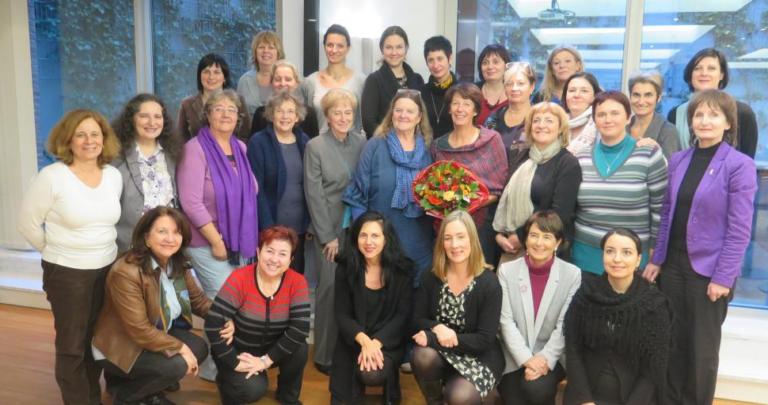[Brussels, 12 October 2012] The EWL organised on Monday 08 October a strategic seminar gathering key high-level decision-makers and representatives of women’s organisations to discuss the issue of violence against women at the European and international level. Entitled ‘From the local to the global level: Moving forward to end violence against women’, and supported by MEP Raül Romeva and the Heinrich Böll Foundation, the seminar was a unique time for representatives of EU institutions, the Council of Europe, EU Presidencies, relevant UN agencies and experts as well as women’s NGOs and experts, to exchange on concrete ways to move forward. Despite the absence of EU Commissioners, two key issues were addressed and led to some concrete recommendations:
Ensuring a strong outcome of the 2013 UN Commission on the Status of Women (CSW) and a leading role for the EU in the international scene
While women’s rights are being increasingly threatened, the EU should play a leading role at international level to ensure progress and reaffirmed commitments of all countries for stronger women’s rights. Violence against women will be the main theme of CSW 2013, and the EU and progressive civil society need to work hand in hand to ensure a good outcome for this meeting. For the EWL, it is crucial for the EU to prepare and deliver a strong position and act diplomatically towards the best conclusions at UN level. Next year’s CSW is all the more crucial than in 2003 no conclusions were reached on violence against women.
Rashida Manjoo, UN Special Rapporteur on violence against women: “We need to shift from theory to practice. We need resources to address this structural systemic violation of women’s rights. If there are no conclusions at 2013 CSW, it will confirm the backlash against women’s rights.”
Dagmar Schumacher, UN Women Brussels Office: “Fighting violence against women is a state obligation. The EU needs to foster dialogue and reach out to other countries.”
Wiveca Holst, Swedish expert to the EWL Observatory: “A recent report shows that best way to have good policies on violence against women is to have strong feminist movement.”
Maria Hadjitheodosiou, Cyprus Presidency of the EU: “We hope that the current work, including the forthcoming Council Conclusions on violence against women, will lead to action.”
Ensuring progress in the internal and external policies of the EU on violence against women and the ratification of Council of Europe Convention on preventing and combating violence against women and domestic violence
Despite numerous commitments of all EU institutions, there is still no EU comprehensive framework to address and eradicate all forms of violence against women within EU countries. In parallel, the EU is meant to have a common voice on the issue at the international level and has adopted strong human rights guidelines on violence against women in relation to external EU policies. How can this be explained and how can there be more consistency between internal and external EU policies? With the new Council of Europe Convention on violence against women, there is a concrete possibility for the EU to transform declarations into commitments by acceding to this European instrument. The EWL expects a prompt ratification of the Convention by the EU, and more steps to ensure protection from male violence for all women in the EU.
Cécile Gréboval, EWL: “The Council of Europe Convention on violence against women was adopted by consensus. Where is this consensus when it comes to getting it ratified by the EU?”
José Mendes Bota, Council of Europe: “The lack of resources is an additional excuse to the political backlash. Violence against women should be back on the first range of priorities. The EU should be leading on this.”
Mikael Gustafsson, MEP: “Ms Reding said that she wanted ‘no paper, more action’. We want a directive, it is real action!”
Michele Levoy, PICUM: “All women should be protected. Exclusion leads to impunity.”
The EWL will follow-up actively on this seminar, by giving visibility to its recommendations, campaigning for the EU to ratify the Council of Europe Convention, and advocating for an EU Year and Strategy to end violence against women. The seminar ended up with a group photo where all participants showed the EWL’s postcard ‘Make My Year. End violence against women in Europe now.”
Recommendations from the seminar
- The EU should ratify the Council of Europe Convention as soon as possible.
- Each EU Presidency should also ratify the Convention and foster other Member States to do alike.
- The EU should guarantee that women’s organisations can be present at the 2013 CSW.
- The EEAS should include the issue of violence against women and of the CSW in all its partnership and diplomacy work with third-countries.
- The EU should engage with all countries in light of the CSW, in order to prepare the conclusions on violence against women. Such dialogue should go beyond the divide North/South in order to constructively find common grounds for agreement.
- The EU should elaborate a comprehensive strategy to end violence against women, to go beyond the current piecemeal approach which is not consistent and doesn’t protect all women in Europe.
Participants in the discussion:
- Mikael Gustafsson, MEP and Chair of EP Women’s Rights Committee
- Daniela Bankier, Unit Director JUST/D2, and Maria Tomassetti, Deputy Unit Director JUST/D2, European Commission
- (Jivka Petkova, Responsible for Women’s Rights and Gender Policy, Human Rights and Democracy Directorate, European External Action Service) – excused
- Rashida Manjoo, UN Special Rapporteur on Violence Against Women
- Dagmar Schumacher, UN Women Brussels Office Director
- Mendes Bota, General Rapporteur on violence against women of the Parliamentary Assembly of the Council of Europe and Political Coordinator of the Parliamentary Network Women Free from Violence
- Maria Hadjitheodosiou, Political Advisor of the Permanent Representation of the Republic of Cyprus to the EU
- Cécile Gréboval, EWL Secretary General
The European Women’s Lobby also invited partners and stakeholders, who work on the issue of violence against women to the seminar, in order for them to bring an added value to the discussion by sharing their experience and expertise. Fifteen experts to the EWL Observatory on violence against women, coming from all over Europe, were present; the European Institute for Gender Equality and the Fundamental Rights Agency were represented; representatives of several European-wide NGOs also attended: Mental Health Europe, PICUM – Platform for International Cooperation on Undocumented Migrants, WAGGGS – World Association of Girl Guides and Girl Scouts, Amnesty International End FGM Campaign, EDF – European Disability Forum, CONCORD – European NGO Confederation for Relief and Development, Social Platform, European Network of Migrant Women, CIFCA – Iniciativa para Copenhague para Centroamérica y México, OIDHACO – Oficina Internacional de Derechos Humanos-Acción Columbia, Oxfam Solidarity.
More information:
EWL webpage ‘For a EU Year to End Violence against Women’
Council of Europe Parliamentary Network ‘Women Free From Violence’



